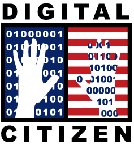- Read about ways that students can use technology to get engaged civically.
- Suggest a digital service project.
Certainly, we want our students to be safe, responsible, critical and efficient consumers of digital information. But just as being a citizen of a country is more than obeying the laws, being a good digital citizen means being actively engaged, contributing to the digital society.
Let’s face it. When students go on multi-player electronic games or develop friends on Facebook, they are involved in building a digital community. For some students, that digital community may be more meaningful and rewarding than their physical daily life. What are the rules in those communities? Who creates and enforces them – and how is this done? Cyberspace may truly be the last frontier.
As the physical and digital worlds intersect, today’s students need to be safe and productive in each realm, and each world can inform the other. Consider the impact of the Internet and viral campaigning in the 2008 Presidential election. Students may not realize the potential power they have; with technical expertise, they could change the course of history. Note that Mark Zuckerman is one of Time’s youngest persons of the year (Charles Lindbergh, another man whose achievements depended on technology, was the youngest).
Sometimes students feel as if they have little control in their lives, at the same time that they want to make a difference and embrace a cause for good. We can leverage that idealistic enthusiasm by giving them the tools and issues that they can promote in a positive voice. Not only can digital citizenship empower students, but it can help them connect with their communities, extending their vision.
Discovery Exercises:
1. Go to the wiki Resource page, and choose one website under the heading “Civic Engagement.” All of these sites are applicable to students or librarians (who can enlist the help of students). As you explore your website, ask yourself these questions:
- What is the issue being addressed?
- What is the goal of the web’s entity?
- How does the issue relate to citizenship in its broadest concept?
- How is technology leveraged to address the issue, to solve the problem?
- What role can students play in this civic action? How can they make a positive contribution?
What knowledge and skills would students need to contribute to this effort?
How might the library or school get involved in this effort?
2. If that website and cause look promising (or you find another one in this list or from another source), think about ways that students can learn about this website and its issue. Brainstorm ways that students might get engaged: through the curriculum, via interest or service clubs, as a school-wide initiative, in partnership with a youth-serving organization.
3. Think about possible entities that might partner with the library in digital citizenship projects. By considering digital engagement, libraries too extend their vision and power, especially as they partner with like-minded organizations.
